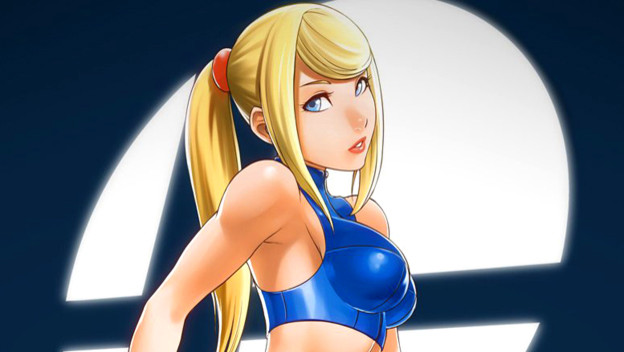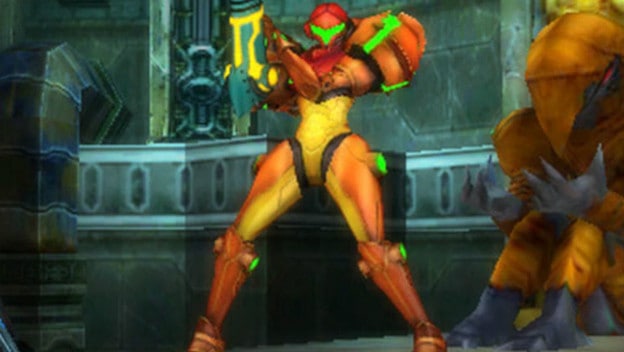Nintendo’s momentum only builds as 2017 progresses, and as the events of E3 showed, there’s no sign of slowing down. While Super Mario Odyssey in playable form alongside ARMS and Splatoon 2 captured the bulk of attendee attention, Nintendo’s streaming events held a few bombshells for everyone watching at home. In particular, after years of anticipation, anguish, and even cartoonish Internet begging from some fans, Nintendo announced not one, but two new Metroid games. But while niche fanbases can be loud, they don’t historically turn up in the numbers companies like Nintendo needs to make games like Metroid a success. But now, the timing feels right. Due to a number of factors, Nintendo’s long silence and sudden double-helping of its struggling sci-fi epic is a sign of a gamble, one poised at the perfect time for a big payoff.
Like I said, Metroid doesn’t historically bring the numbers. While it’s a notable IP in Nintendo and videogames history, it doesn’t have the same mass-market appeal as a Zelda or Mario . Those games sell like crazy, meanwhile the entire Metroid series has maybe, collectively sold as much as one tentpole Mario game. That’s a rough risk/reward proposition to make, and while Nintendo sees and knows the value in all its IP, looking at the rough experimentation throughout Metroid history is example enough of its struggles.
Things like Metroid Prime wouldn’t have happened if there was enough genuine interest in the series to generate hella cash. But the writing is clearly on the wall: Nintendo wanted to make the IP a viable platform, but didn’t know what to do with it. Perhaps understated is the series’ lack of appeal in Japan. For whatever reason, while Metroid games do okay in the west, the country of origin probably couldn’t care less. That’s less of an issue now, as western growth has only become stronger while console gaming in Japan is slowly dwindling, but around the time of the GameCube, things were hard to justify. Hence Retro getting the job and taking a more western-friendly approach. Ultimately, it did well and built a brand, but still a niche brand.
The series would continue on the GBA as well in a grassroots kind of manor, with a remake of the original Metroid and a new game called Metroid Fusion that would somewhat get rid of the exploration elements attributed with the series. But after some experimentation on the DS, Metroid seemed to practically vanish outside of the obligatory Smash Bros. appearances. Game development at this time became more expensive, and due to things like global economic troubles, risks became much less attractive. Metroid: Other M seemed to be the final nail in the coffin; it was an admirable attempt at bringing the Japanese audience back, but was ultimately a misguided approach that alienated the west.
Then the 3DS and Wii U happened, and things seemed dire. The Wii U was, arguably, a failure of a platform. While the attach rate sales for software were good and new IP like Splatoon found underground success, something like a new, AAA Metroid did not have a chance at all. Even on the 3DS, Nintendo seemed gun-shy. Two years ago, tons of drama surrounded Nintendo’s E3 showcase when a goofy little multiplayer sports game, branded with the Metroid Prime logo, was the only representation on hand.
Now there are suddenly two new Metroid games and it’s easy to see why. Nintendo obviously wanted to do these, but needed to figure out the best approach. And here’s the deal: this is the perfect time to revisit older concepts and revive stagnant IP. Let’s look at the 3DS game first, Metroid: Samus Returns . It’s a remake of Metroid II , a Game Boy game. But more importantly, it’s a classic-style Metroid , one built on the systems that gave way to the term “Metroidvania,” the bane of grumpy journalists and joy of die-hard fans of exploration-based platformers. Metroid has shied away from the formula in the past, but now it’s screaming back at a time when Nintendo interest is at a notable high, and the built-in install base of the 3DS is hungry for content while Switches are still trickling out into stores.

The genre is at an all-time high demand. The “Metroidvania” is all over the place. Games like Axiom Verge and Ori and the Blind Forest have generated tons of buzz and sales. Not just because they’re cool games, but because nostalgia is super in right now, and reminding folks that games like Super Metroid and Castlevania: Symphony of the Night were dope. After all, Iga is famously making another game of his own, Bloodstained , after leaving Konami over declining sales on the Castlevania- side of the equation. As we’ve reported here plenty of times this year, Japanese-style games are facing a huge resurgence in demand, and the western markets are eating them up.
While Metroid: Samus Returns feeds off the nostalgia hype, Metroid Prime 4 is also in a great position to do well, more so than before. Nobody would buy a Metroid Prime on the Wii U, because nobody would buy anything on the Wii U; it wasn’t going to happen. Retro did super well with Donkey Kong Country Returns , both critically and financially. Donkey Kong Country: Tropical Freeze was an excellent sequel, but nobody came out for it. Super Mario 3D World didn’t work, neither did a new Smash Bros. or Mario Kart . Meanwhile, the same Mario Kart is released on Switch, a much more attractive console than the Wii U, and it sold record numbers. This is Nintendo’s chance to go all out with the stuff it was hesitating on in a darker time, and so far we’ve been shown that Nintendo is aware and is striking while the iron is hot.
Nintendo clearly played the long con, totally aware of how rabid and desperate the Metroid fanbase was getting. Naming the goofy soccer game Metroid Prime Federation Force was a calculated sacrifice; slap the brand on a silly game to get the silly game some extra sales it wouldn’t have before, but at the same time gauge interest. Riling the fanbase up in preparation for a new console with a fresh start was a gamble. But it seems to have worked in a general sense, with sales continuing to exceed expectations. Now it’s up to the Metroid fans to deliver on their end – will we see record numbers for the franchise, or will history once again repeat itself? This is the absolute best shot Metroid has, but it might also be one of the last.
Image Credit: polarityplus
